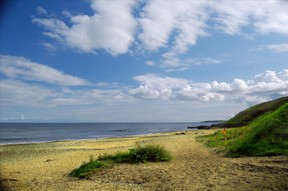 Patricius could be forgiven his confusion over the message, above and beyond even the medium of its delivery. He was far inland, well away from the sea. There wasn't a great profusion of ships anywhere in the vicinity.
Patricius could be forgiven his confusion over the message, above and beyond even the medium of its delivery. He was far inland, well away from the sea. There wasn't a great profusion of ships anywhere in the vicinity.
But a little hope is a big thing. It gave him courage and a sense of recklessness, which had hitherto been knocked out of him. He left. He just up and ran from the hillside, abandoning the pigs and his master.
He couldn't go north. That was straight into his master's stronghold, even if it was the nearest coastline. He hurtled south instead, trying just to put enough distance between himself and his captors, before he found this fabled ship.
Along the way, he 'acquired' items. Later in life, there would be oblique references to a 'sin', which many have taken to mean stealing. He never gave the details, but this seems like a likely time in his life history. He left his post naked, and he was dressed by the time he finally reached a port. He also had money for the crossing. St Patrick never did attempt to say that the good Lord had provided so practically, on the way to the coast in County Wexford.
Nevertheless, the Irish sailors treated this stranger with some suspicion. Patricius stood bound in the confidence of an iron faith. He had travelled over two hundred miles on foot to be there. At no time was he pursued nor stopped. He had passed through countless territories without being spotted, nor fingered as a runaway slave.
Nor was there any turning back now. He'd made it so far. If he was sent back, then he'd be executed as an example to his fellow slaves. It was do or die; but the voice had made promises in the darkness and there was a ship. It had to take him home.
The ship's captain laughed in his face. "You're not coming on my boat. I have no idea who you are." Behind him, his crew were loading up the cargo hold with prize hunting dogs. Those Irish breeds fetched a high price on the Continent. "Go away."
Stunned, his faith shaken and his confidence draining, Patricius turned to slope back to the hut he'd sheltered in overnight. Automatically, his lips moved in a fervent prayer, while tears washed his eyes. Let them change their minds. Let them change their minds.
There was a yell. It wasn't the captain, but another sailor standing by. "Oy! Go on, they're calling you!"
Patricius barely drew a breath. He turned back to find that the last of the dogs were loaded and the captain was shouting his orders to cast off. But the ship was waiting for him. Patricius raced back, hope flaring again and his money clasped in his hand.
The captain was gruff and curt, "Ok, we'll take you on trust, but you'll have to go in with the dogs."
It's hard to imagine how Patricius must have felt, as he saw the Irish coastline receding far into the distance. He never thought to see it again. Six years after having been snatched from his parents, he was going home. It was over.



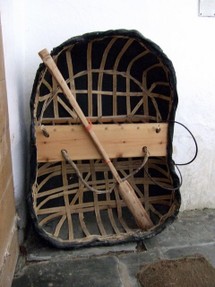 The terror must have been palpable that day. There was nothing new about Irish slavers sailing across from the great slave port of Dublin, but rarely anything on this scale.
The terror must have been palpable that day. There was nothing new about Irish slavers sailing across from the great slave port of Dublin, but rarely anything on this scale.


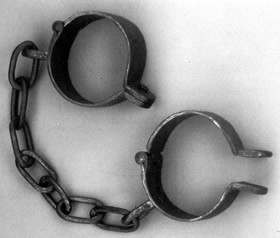 First they stripped him and took his name away. The attire of a well-born boy was not appropriate for a slave. As for Patricius, that sounded way too foreign.
First they stripped him and took his name away. The attire of a well-born boy was not appropriate for a slave. As for Patricius, that sounded way too foreign.


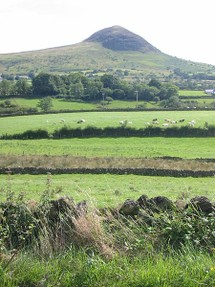 Patricius's grandfather had taken holy orders, ordained as a Catholic priest. His son, Patricius's father, hadn't gone so far, but he was still religious. He'd served the Church as a deacon and taught his children the gospel.
Patricius's grandfather had taken holy orders, ordained as a Catholic priest. His son, Patricius's father, hadn't gone so far, but he was still religious. He'd served the Church as a deacon and taught his children the gospel.



 Patricius could be forgiven his confusion over the message, above and beyond even the medium of its delivery. He was far inland, well away from the sea. There wasn't a great profusion of ships anywhere in the vicinity.
Patricius could be forgiven his confusion over the message, above and beyond even the medium of its delivery. He was far inland, well away from the sea. There wasn't a great profusion of ships anywhere in the vicinity.


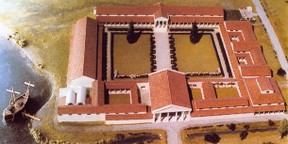 It took months for Patricius to make his way back to Britain, and more weeks to walk back home. The Irish dog traders had dropped him off in France, so he still needed to cross the English Channel.
It took months for Patricius to make his way back to Britain, and more weeks to walk back home. The Irish dog traders had dropped him off in France, so he still needed to cross the English Channel. 




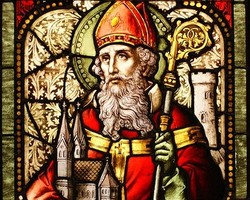

 St Tydecho's Churches in West Waleson 09/03/2014
St Tydecho's Churches in West Waleson 09/03/2014
 Goodies for an Outlander Premiere Partyon 03/06/2015
Goodies for an Outlander Premiere Partyon 03/06/2015
 Holocaust Memorial Day Interview with Rainer Höss, Grandson of Rudolf Architect of Auschwitzon 01/24/2015
Holocaust Memorial Day Interview with Rainer Höss, Grandson of Rudolf Architect of Auschwitzon 01/24/2015
 Romantic Valentine Gifts for an Outlander Fanon 01/16/2015
Romantic Valentine Gifts for an Outlander Fanon 01/16/2015

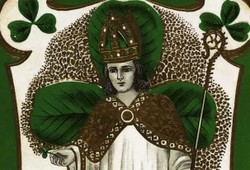

Comments
I'm glad that you liked it. :) He was a fascinating bloke.
I absolutely love this! I'll be reading all the installments.
:D I'm glad that you thought so. :D
I thought I knew his history - but you make the story alive. WOW.
You're welcome. :) I'm planning on writing part two tomorrow.
Thank you, I really enjoyed this. It was good to learn more about St. Patrick. :)
I'm glad that it moved you.
If you could see my desk at the moment, you'd see where it's all coming from. I have four different Irish history books lying open, with bits of paper stuffed into them like hedgehog spikes. It's always good to know that I've amalgamated these tidbits in an interesting way.
I'm glad that you liked it. That poor lad... :( But he makes good in the end!
Oh yes, I'm looking forward to Part Two! :) This was very nice.